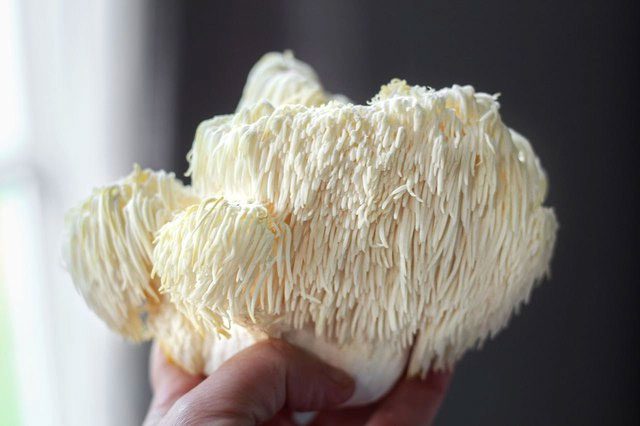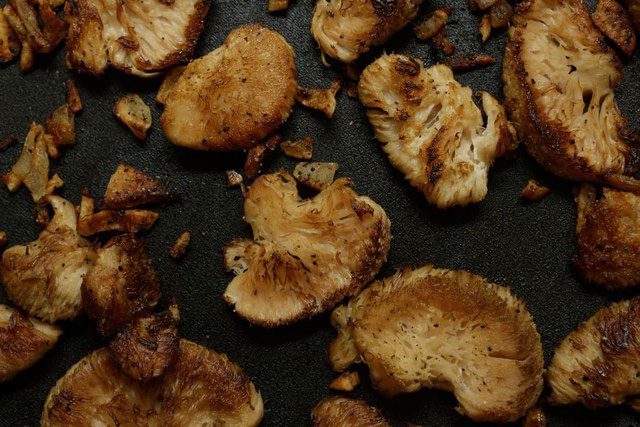In ancient times, mushrooms were simply a humble dish favored by rural communities. Today, mushrooms have transformed into a delicious addition to meals.
Mitzi Dulan, author of the book “The Pinterest Diet”, commented on mushrooms as follows: “Typically, white foods are considered low in nutrition, but mushrooms are an exception. They are rich in minerals such as selenium, potassium, copper, iron, and phosphorus – nutrients not commonly found in plant-based foods. For this reason, mushrooms are extremely valuable.”
Lion’s Mane Mushroom – A Sought-After Delicacy
Young Lion’s Mane mushrooms are white or ivory in color, with white flesh, turning yellow or dark yellow as they mature, and the mushroom’s spines form the fruiting body. This dish is not widely known in Vietnam but has long been used in Traditional Chinese Medicine.

Young Lion’s Mane mushrooms are white or ivory in color.
Most mushrooms are used as medicinal herbs, while a few are consumed as food similar to common mushrooms due to their delicious flavor and sweet, seafood-like aroma.
Currently, Lion’s Mane mushrooms are sold both fresh and dried. On the market, the price of fresh and dried Lion’s Mane mushrooms is relatively high. The price of fresh Lion’s Mane mushrooms ranges from 300,000 to 400,000 VND per kilogram.
In contrast, the cost of dried Lion’s Mane mushrooms is much higher than that of the fresh variety, ranging from 1,200,000 to 2,000,000 VND per kilogram. The significant price difference is due to the fact that it takes about 10 kilograms of fresh mushrooms to produce just 1 kilogram of dried Lion’s Mane mushrooms.
Health Benefits of Lion’s Mane Mushrooms
According to Traditional Medicine, Lion’s Mane mushrooms are considered a herbal remedy with therapeutic effects. The compounds in these mushrooms possess antioxidant properties, regulate lipid levels, and lower blood sugar levels.
Additionally, Lion’s Mane mushrooms enhance the immune function of the human body, providing significant benefits for patients with gastrointestinal cancers and assisting in the treatment of dyspepsia and nerve exhaustion.
Supports Diabetes Management
Diabetes is a condition that occurs when the body loses its ability to control blood sugar levels, resulting in consistently elevated levels.
Some animal studies have shown that Lion’s Mane mushrooms can significantly lower blood sugar levels in both normal and diabetic mice, even at low daily doses of 2.7 mg/pound (6 mg/kg) of body weight.
Animal studies support the use of Lion’s Mane mushrooms in diabetes management. The mushrooms may improve metabolic function by helping regulate blood sugar and insulin levels.
Prevents Cancer
Preliminary research suggests that Lion’s Mane mushrooms are a promising food for protection against cancer. In a 2011 study published in Food & Function, human cell tests showed that Lion’s Mane mushrooms could help eliminate leukemia cells.
Furthermore, a 2011 study published in the Journal of Agricultural and Food Chemistry indicated that Lion’s Mane extract helped reduce tumor size in colorectal cancer in mice.
The findings suggest that Lion’s Mane mushrooms may help combat colorectal cancer by enhancing activity in certain immune response-related cells. Scientists also discovered that this mushroom contains compounds that may help reduce the spread of colorectal cancer cells to the lungs.
However, it is still too early to determine whether Lion’s Mane can help prevent or mitigate cancer in humans.
Lowers Blood Cholesterol
Lion’s Mane mushrooms contain unsaturated fatty acids that are beneficial for blood circulation and can reduce blood cholesterol levels. This makes them an ideal food for patients with hypertension and cardiovascular diseases.
Major risk factors for heart disease include obesity, high triglycerides, a large amount of oxidized cholesterol, and a tendency toward thrombosis. Experts believe that Lion’s Mane extracts may affect some of these factors and reduce the risk of heart disease.
Studies in mice and rats have found that Lion’s Mane extracts improve fat metabolism and lower triglyceride levels.

This is an ideal food for patients with hypertension and cardiovascular diseases.
Improves Brain Function
According to a study published in Phytotherapy Research in 2009, Lion’s Mane mushrooms have a positive effect on older adults with mild cognitive decline. In this study, scientists assigned 30 older adults with mild cognitive decline to take Lion’s Mane extract for 16 weeks.
In cognitive tests administered at weeks 8, 12, and 16 of the study, volunteers consuming this mushroom showed significantly greater improvements compared to the control group.
In a study published in Biomedical Research in 2011, scientists examined the effects of Lion’s Mane on brain function in mice. The results indicated that Lion’s Mane helps protect against memory problems caused by the accumulation of amyloid beta (a substance that forms brain plaques related to Alzheimer’s disease).
Research has also shown that the neuroprotective effects may counteract ischemic stroke.
Reduces Depression and Anxiety
Research to date suggests that Lion’s Mane mushrooms may help alleviate depression and anxiety. For instance, a 2020 study referred to this mushroom as “a potential alternative medicine for treating depression.“
Similarly, a 2021 review study detailed several studies showing significant anti-anxiety effects.


















































